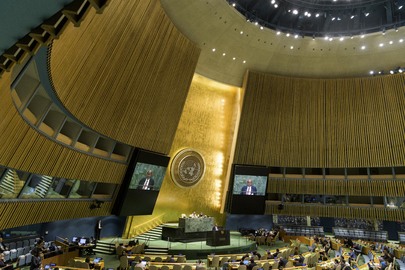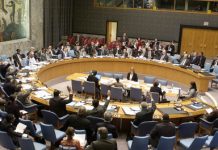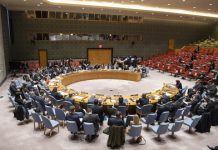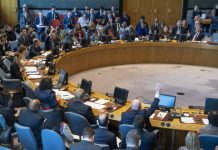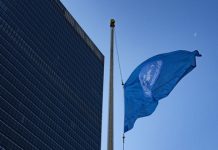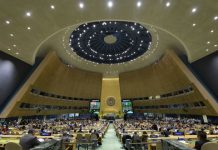Ambassadors were briefed by the UN Special Envoy for Yemen, Hans Grundberg, who commended Oman for its efforts to achieve the agreement which came into effect on 6 May.
He said the cessation of hostilities represented an important and necessary de-escalation in the Red Sea following the resumption of deadly US airstrikes on Houthi-controlled areas in Yemen.
Resolve the conflict
However, recent events show that the country is still ensnared in wider regional tensions, he said, pointing to Houthi attacks on Ben Gurion Airport in Israel and Israel’s subsequent strikes on Hudaydah Port, Sana’a Airport, and other locations.
“Nevertheless, the announcement of 6 May provides a welcome opportunity on which we must collectively build to refocus on resolving Yemen’s conflict and advancing a Yemeni-owned peace process,” he said.
The Houthis, also known as Ansar Allah, and Yemeni Government forces, backed by a Saudi-led coalition, have been battling for control of the country for more than a decade.
‘Yemenis want to move forward’
“The challenges facing Yemen are immense: from the deep and significant levels of mistrust between the parties, with some still reportedly preparing for war, to near economic collapse,” Mr. Grundberg told the Council
He said the UN will continue to work to bring the sides to the table to identify and agree on solutions that are acceptable to all.
“Yemenis want to move forward – the status quo is untenable,” he insisted. “And while the frontlines may currently appear relatively stable, what Yemen has now is not peace.”
He stressed the need for continued engagement by the international community to help Yemenis realize their desire to build a stable, prosperous and safe country.
Release detained staff
Mr. Grundberg used the briefing to again highlight the plight of personnel from the UN, international and national NGOs, civil society and diplomatic missions, who continue to be arbitrarily detained by the Houthis.
“Not only is their detention in violation of international law, but it has also caused a significant chilling effect throughout the international community, which only has one outcome: undermining support to Yemen, which will sadly impact the Yemenis most in need,” he said.
He welcomed the recent release of staff members from the Dutch Embassy and international organization, saying “this demonstrates what is possible, but these releases are woefully insufficient.”
Message to the people
The Special Envoy concluded his remarks by stating that Yemenis have endured over 10 years of instability, uncertainty and economic collapse.
Speaking directly to the population, he reiterated that “I see you. I hear you. You have not been forgotten – and I won’t relent in my efforts to pursue peace and stability in Yemen.”
He urged the warring parties “to be courageous and choose dialogue,” emphasizing that “the United Nations will not waiver in its commitment to support you in finding a negotiated settlement to this conflict.”
Humanitarians ‘running out of time’: Fletcher
UN Emergency Relief Coordinator Tom Fletcher, who also briefed the Council, shared the Special Envoy’s relief at the cessation of hostilities in Yemen.
He stressed, however, that “Yemen is not out of the woods” as the humanitarian situation is deteriorating, with children most affected.
“Half of Yemen’s children – or 2.3 million – are malnourished. 600,000 of them severely so,” he said.
Childhood killers on the rise
Moreover, “malnutrition is not just about hunger,” he added, as it attacks immunity, leaving children vulnerable to deadly infections like pneumonia and diarrhoea – both leading causes of child mortality in Yemen.
The country also has one of the worst immunisation rates in the world as only 69 per cent of children under a year old are fully immunized and 20 per cent have received no vaccinations at all.
As a result, diseases such as cholera and measles are rising. In 2024, Yemen accounted for over a third of global cholera cases and 18 per cent of related deaths, in addition to having one of the highest measles burdens globally.
“Children are not alone in being disproportionately impacted,” said Mr. Fletcher, as malnutrition also affects 1.4 million pregnant and breastfeeding women in Yemen, placing mothers and newborns at grave risk.
Overall, some 9.6 million women and girls are in severe need of life-saving humanitarian support, he said.
Appeal to the Council
He warned, however, that humanitarians “are running out of time and resources” as their 2025 response plan for Yemen is barely nine per cent funded.
“These shortfalls have very real consequences,” he said. “Nearly 400 health facilities – including 64 hospitals – will stop operating, impacting nearly seven million people.”
Meanwhile, funding for 700 midwives is quickly running out and 20 therapeutic feeding centres and more than 2,000 therapeutic feeding programmes have already been forced to close down.
Mr. Fletcher made three requests to the Council, calling first for action to ensure respect for international humanitarian law, including protection of civilians as well as access to all those in need.
He urged ambassadors to also provide scaled-up, flexible funding to sustain critical aid operations.
“Third, and as the Special Envoy has underlined, back efforts towards lasting peace,” he concluded.
Source of original article: United Nations (news.un.org). Photo credit: UN. The content of this article does not necessarily reflect the views or opinion of Global Diaspora News (www.globaldiasporanews.net).
To submit your press release: (https://www.globaldiasporanews.com/pr).
To advertise on Global Diaspora News: (www.globaldiasporanews.com/ads).
Sign up to Global Diaspora News newsletter (https://www.globaldiasporanews.com/newsletter/) to start receiving updates and opportunities directly in your email inbox for free.


